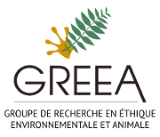Conférence internationale CRÉ/GRÉEA : « Convergence et divergence entre éthique animale et environnementale » | 17-19 Mai
Conférence internationale CRÉ/GRÉEA en éthique environnementale et éthique animale :
« Convergence et divergence entre éthique animale et environnementale »
Quand : 17-19 Mai 2017 (toute la journée)
Lieux de la conférence :
- Conférence (17-19 Mai) : Arts W-120, McGill, 855 Sherbrooke St W, Montréal
- Présentation de soirée (18 Mai) : Salle H-290, 1455 De Maisonneuve Blvd. W., Montréal
Entrée libre et gratuite (dans la limite des places disponibles)
Présentation
« [T]wo streams of thought meet and are woven together… [in]to the beginnings of what, I believe, will be a lasting marriage. (Though I have no illusions about the tranquility of that particular relationship.) » (Singer 1992)
Environmental ethics and animal ethics have much in common. For one thing, each field has firmly established itself over just the past few decades. On the theoretical side, this has meant the founding of journals like The Journal of Animal Ethics and Environmental Ethics; and on the practical side, the organization of activist groups running the gamut from polite to militant. For the most part, both fields have also shared a commitment to non-anthropocentrism. As the editor of a recent anthology put it, « Environmental ethics [which for him includes animal ethics] begins the moment we reject the view that only humans can be moral patients… » (Williston 2016). In other words, humans are not the only entities in the universe worthy of direct moral concern.
Animal and environmental ethics have tended to differ, however, on the question of just which other entities do count for their own sakes (rather than merely for the sake of humans). Environmental ethicists have often included all individual animals, plants, and other organisms; along with « soils, waters » and the ecosystemic « community as such » (Leopold 1949). In contrast, animal ethicists have tended to limit their direct moral concern to beings able to experience joy and suffering (Singer 1975). Animal and environmental ethicists have also largely applied their respective theories to different domains, i.e., domesticated animals including pets, livestock, and laboratory subjects; vs. wild organisms, species, and ecosystems.
However, humans are causing increasingly strong interactions between the wild and domestic realms. For example, the overfishing of wild populations has induced a massive rise in fish farms. Conversely, scientists now identify animal agriculture in general as the world’s leading cause of biodiversity loss (Machovina et al. 2015). Furthermore, it has been nearly 25 years since two important book-length anthologies focused on the relationships between environmental and animal ethics (Hargrove 1992, Ryder 1992). We therefore plan to host a conference on the topic in May 2017, and to publish a new edited volume based on it.
The conference will bring together major established scholars, as well as up-and-coming researchers, in both fields. Speakers will address convergence and divergence between animal and environmental ethics. To wit, how much overlap is there between the policies that would be morally required for the sake of animals alone (including humans), vs. those required for the sake of organisms (including animals), entire species, and ecosystems? We will focus on answers to this question in the following contexts: (1) the wild vs. domesticated spheres, (2) predation by some non-human animals upon others, and (3) animal agriculture.
Réferences
Hargrove, E. C., editor. 1992. The Animal Rights, Environmental Ethics Debate. State University of New York, Albany, NY.
Leopold, A. 1949. A Sand County Almanac. Oxford University. New York, NY.
Machovina, B., K. J. Feeley, and W. J. Ripple. 2015. Biodiversity conservation: The key is reducing meat consumption. Science of the Total Environment 536:419-431.
Ryder, R. D., editor. Animal Welfare and the Environment. Gerald Duckworth. London, UK.
Singer, P. 1975. Animal Liberation. Avon. New York, NY.
Singer, P. 1992. Foreword. In: Ryder, R. D., op. cit.
Williston, B. 2016. Moral standing. In: Williston, B., editor. Environmental Ethics for Canadians. Oxford University. Toronto, ON. P. 25.
Conférencières-iers invité-e-s (par ordre alphabétique)
- Mark Budolfson, College of Arts and Sciences, University of Vermont, Vermont, USA
- Ned Hettinger, Philosophy, College of Charleston, South Carolina, USA
- Oscar Horta, Logic and Moral Philosophy, University of Santiago de Compostela, A Coruna, Spain
- Virginie Maris, Centre d’écologie fonctionnelle et évolutive du CNRS, Montpellier, France
- Katie McShane, Philosophy, Colorado State University, Colorado, USA
- Gregory Mikkelson, McGill School of Environment & Department of Philosophy, Montreal, Canada
- Claire Palmer, Philosophy, Liberal Arts Texas A&M University, Texas, USA
- Jeff Sebo, Philosophy, University of North Carolina at Chapel Hill, North Carolina, USA
- Tatjana Višak, Philosophy, Mannheim University, Germany.
Conférencières-iers invité-e-s (par ordre alphabétique)
- Antoine C.-Dussault, Philosophie, Université Paris 1/IHPST et University of Toronto/IHPST
- Nicolas Delon, Environmental Studies and Animal Studies, New York University
- Gregory McElwain, Philosophy and Religious Studies, The College of Idaho
- Angie Pepper, Philosophie, Centre de recherche en éthique (CRÉ)
- Duncan Purves, Environmental Studies and Bioethics, New York University
- Rhys Southan, Philosophy, University of Oxford
Table ronde | Présentation de soirée
- Conférencier principal : John Baird Callicott, Philosophy, University of North Texas, North Texas, USA;
- Animatrice et conférencière: Élise Desaulniers, Chercheuse indépendante
Commentatrices :
- Angela Martin, Éthique et philosophie, Université de Fribourg, Suisse;
- Sophia Rouseau-Mermans, doctorante en philosophie, Université de Montréal et Université Paris 1-IHPST.

 Next Post
Next Post